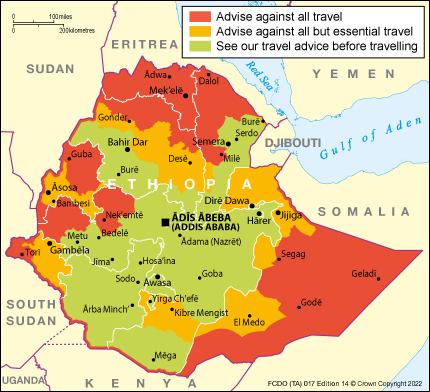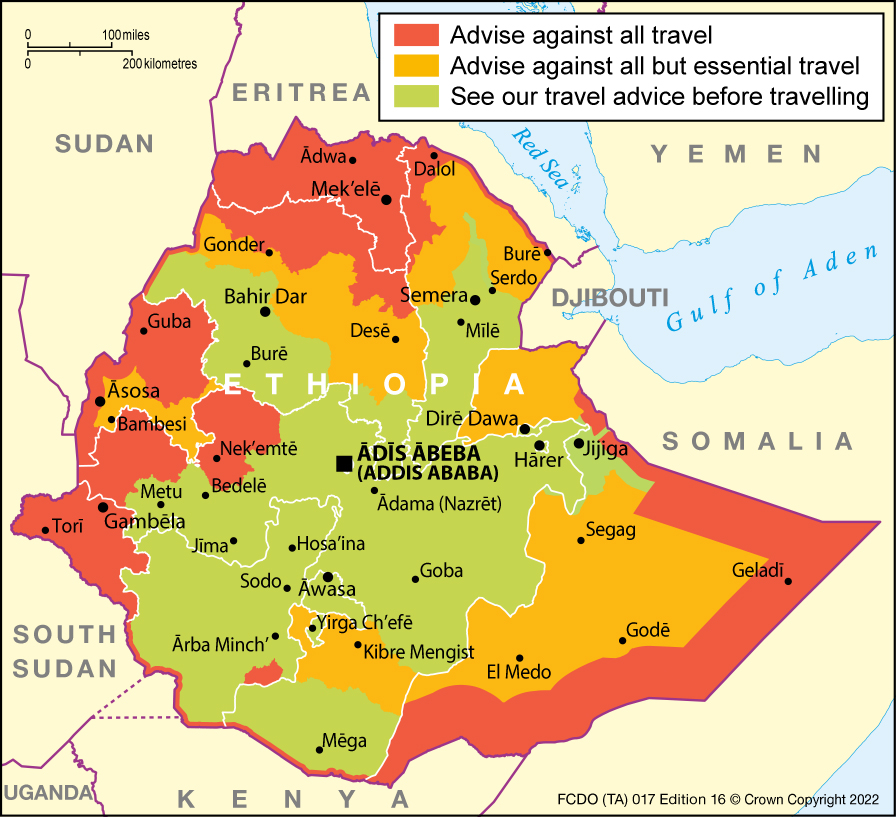Ethiopia
Summary


The Foreign, Commonwealth & Development Office (FCDO) advise against all travel to:
the whole of Tigray regional state
the north and northwest of Amhara regional state (including the whole of North Gonder Zone; the Lay Armacho, Tach Armacho, Tegete, Wegera, West Beles, East Beles, Kinfaz woredas of Central Gonder Zone; Mirab Armacho of West Gondar Zone; the whole of Wag Hemra Zone and North Wello Zone)
the northwest of Afar regional state
(Chiffra-andMileworedasofZone1;Yalo,GulinaEwaareasworedaswithin 10km ofZone4)the
fourborderWoredaswith(Akobo,TigrayWantawo,regionalJikawoandLare)ofNuerZoneand- the
JorewholeWoredatheAgnuakZonein the West Wollega Zone, East Wollega Zone, Kellem Wellega and Horo Gudru Wellega in the Oromia regional state
-
the whole of the Metekel Zone and Maokomo Special zone in the Benishangul Gumuz regional state
the
NogobKonso(previouslySpecialFik),WoredaJararof(previouslytheDegehabur),SouthernShabelleNations,(previouslyNationalities,Gode),KoraheDolloPeoples’(previouslyRegionWarder)ZonesoftheEthiopianSomaliRegionalStatewithin 10 km of the border with South Sudan
-
within 100 km of the Ethiopian border with Somalia and Kenya in
theAfderandLibenZonesof1030 km of the Ethiopian border with Somalia in Fafanzonezone, with the exception of border town and crossing at Wajale, and the principal road between Jijiga and Wajale. within 10 km of the border with Sudan and the other parts of the Kenyan border, with the exception of principal roads/towns
The FCDO advise against all but essential travel to:
allinotherareasoftheincludingthe Siti zone,FafanthezoneNogob(with(previouslytheFik),exceptionJararof(previouslytheDegehabur),mainShabelleroad(previouslyandGode),railwayKorahelineandtoDolloDjibouti),(previously Warder), and the areas of Liben and Afder zones more than 100km from the Somalia and Kenya borders- in Amhara regional
statestate, the whole of South Gonder, South Wello and Oromia Special Zones; the - the Telelak, Dewe, Arturna and Fursi woredas of Zone 5; Yalo, Gulina and Ewa woredas in Zone 4 (apart from all areas south of the Chifra – Semera highway); Afdera woreda in Zone 2, with the exception of the road to Afdera town, including the town of Afdera); and within 10km of the border with Eritrea in Afar regional state
- the West Guji and Guji zones, in the Oromia regional state
- the rest of
Gambellaregionalstate - the
restofthe
There is a military conflict ongoing in northern Ethiopia. The conflict has potential to escalate and spread quickly and with little warning. The FCDO advises against all travel to Tigray region and to parts of northern Amhara region and western Afar region. If you are in Tigray region, you should leave where safe to do so. If you are in the vicinity of military activity and you cannot leave safely, you should stay indoors, away from windows and remain alert to developments that would enable you to leave safely. See Tigray Region, Amhara Region, and Afar Region.
There have been reports of incidents along the Addis Ababa – Bahir Dar road, including those of armed men attacking vehicles. These usually take place in the early hours when there is poor visibility. You should exercise additional caution and avoid traveling in the dark or when visibility is poor. See Amhara Region
There has been an increase in sporadic conflicts between armed groups in Oromia region and Amhara region. These are mostly reported to be taking place in rural areas of Oromia region, with limted clashes in Amhara region, including in urban areas. You should exercise caution when traveling and be aware that situations have potential to escalate quickly. See Amhara Region and Oromia Region
On 15 February a nationwide State of Emergency, was lifted by the House of People’s Representatives. Those of Tigrayan or Oromo ethnicity may continue to face increased scrutiny, including at the airport and through direct police operations. You should avoid large gatherings and demonstrations. You should carry copies of ID, avoid possession of foreign currency and possession of weapons. You should avoid confrontation and follow the instructions of the authorities. You should monitor local news and social media closely for further updates. See Addis Ababa
Conflict has broken out in Gambella with heavy gunfire reported on 14 June. See Gambella
The current political and security situation means that the consular support the British Embassy can provide may be limited. If you need urgent help, call +251 (0)11 617 0100. If you experience technical difficulties or if you are in the UK call +44 (0)20 7008 5000.
For information on returning to England from Ethiopia, see Returning to the UK.
COVID-19 entry restrictions for Ethiopia
Before you travel, check the ‘Entry requirements’ section for Ethiopia’s current entry restrictions and requirements. These may change with little warning. Monitor this advice for the latest updates and stay in contact with your travel provider.
Travelling from and returning to the UK
Check what you must do to travel abroad and return to England, Scotland, Wales or Northern Ireland.
If you plan to pass through another country to return to the UK, check the travel advice for the country you’re transiting.
There are frequent incidences of civil unrest in Ethiopia, including protests and strikes. Some of these can cause temporary closure of roads, internet and mobile networks or disruption to local businesses and transport. In the past some protests have escalated into serious violence. See Local travel
Terrorists are likely to try to carry out attacks in Ethiopia. Attacks could be indiscriminate, including in places visited by foreigners. You should be vigilant at all times, especially in crowded areas and public places like transport hubs, hotels, restaurants, bars and places of worship and during major gatherings like religious or sporting events. There is a threat of kidnapping in Ethiopia’s Somali region, and on the southern border with Kenya, particularly in the eastern areas to which the FCDO advise against all travel. See Terrorism
Internet connections in Ethiopia, including mobile data, can be intermittent.
Ethiopia is primarily a cash based society and banking facilities, including card payments and ATMs are very limited outside major cities. See Money
There is an ongoing Ebola outbreak in the Democratic Republic of Congo. You may see some additional checks taking place at arrival on all flights into Bole Airport in Addis Ababa. See Health
The Overseas Business Risk service offers information and advice for British companies operating overseas on how to manage political, economic, and business security-related risks.